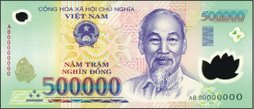Next week, the Vietnamese government will welcome hundreds of American, European, and Asian investors to Hanoi for the first of two semi-annual discussions of the state of the Vietnamese economy. Discussions between companies and the government take place all the time, usually through organizations like the American Chamber of Commerce, but next week's meeting carries uncommon importance. In addition to being sponsored by the World Bank and the IMF, the Vietnam Business Forum (as it's called) opens Hanoi's most venerated policy arenas to international scrutiny, inviting opinions from companies headquartered all over the world. It also receives more western media coverage than any other event in Vietnam.
The transcripts from VBF meetings going back to their inception are uniformly uninteresting -- unless you enjoy hearing people praise autocratic technocracy in many different languages (including Hindi). When your economy's growing at 8 percent, nary an international businessman would dare complain about something so esoteric and surmountable as inadequate technical training. But, as a noted Vietnam economist told me a few weeks ago, this year, Vietnam's economy might not grow at all. Even though the financial crisis has affected Asia less than other regions, Vietnan's economy, which survives on exports and outside investment, has been weakened by external financial turmoil. The time for niceties and applause has finally passed.
Anybody who watches C-SPAN even occasionally probably yearns, at least sardonically, for authoritarian governance. I mean, come on -- I know I'm not the only one who's wondered why we allow elected officials whose backgrounds in finance are as limited as yours or mine to design financial regulation (with able-minded economists sitting ruefully on the sidelines). But it's a sacrifice we make for living in a democracy. In Vietnam, no such sacrifice exists -- the people accept an authoritarian government, and in exchange, they suffer no such rhetorical agony (only outright exclusion -- which doesn't seem like such a bad tradeoff anymore). Policy is made only after it's been formulated by economists, reviewed by investors, redrafted by policy analysts, and approved by policymakers. The Vietnam Business Forum establishes the guiding theme for those proceedings.
My guess is that this year's first forum will concentrate on infrastructure and technical training. The first coincides with the government's widely hailed efforts to push small enterprises into multinational corporations' supply chains. The second responds to the growing demand among high value-added companies for skilled workers. We shall see.
And the New York Times had this interesting article.
G'night!
Monday, May 25, 2009
Subscribe to:
Post Comments (Atom)



No comments:
Post a Comment